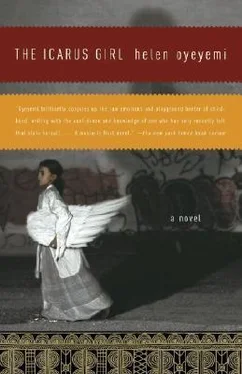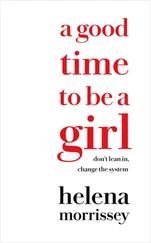At the hospital, Sarah clung to Daniel, refusing to let him go into the private room where Jessamy lay, a motionless mass of tubes and brown flesh and sad green hospital gown, not a girl at all, rather a congruence of pain. She had to apologise to him first: it was all her fault; her stupid way of handling conflict had made this happen. She had thought that either he wouldn’t listen to her, or that he would agree, but to her surprise, he did neither. He listened sprawled in a chair up against the wall, nodding distractedly as behind his glasses his eyes took in the rest of the people moving around the building: doctors and nurses in dusty white coats; a squat, severe looking woman in green iro ati buba arriving with a bowl of home-cooked food. He told her that it didn’t matter about blame. She didn’t know that Daniel didn’t want to go in anyway; he was delaying the dreaded entry for as long as possible. Jess might be OK, Sarah told him, Dr. Adenuga had said that she might be OK. Daniel asked if Jess had regained consciousness since they’d taken her out of the car, and Sarah was forced to tell him no. “Might, might be OK,” Daniel repeated in an expressionless voice that mocked all her hopes. They were talking about fractures and damage and things, but it wasn’t a thing that she could comprehend because it didn’t sound like anything that could happen to a child. Children weren’t hurt like that.
Jess’s grandfather seemed to be dealing with it in his way, though; he had hardly greeted Sarah, instead pushing past her and insisting on seeing the doctor treating Jessamy, who was a friend of his, battling to be allowed into Jess’s room. Once there, unknown to both Sarah and Daniel, after ignoring the stare of the nurse by the bed and looking blankly at this unrecognisable granddaughter with her face silhouetted over a metallic neck brace, Jess’s grandfather took Fern’s heavy ibeji statue out of the drawstring bag he had brought with him and, confident that Dr. Adenuga’s instructions for it not to be moved would be obeyed, put it in the far corner where it could watch. And when he’d gone, the ibeji statue
(dull, unbelieved-in wood)
guarded the corner for the little twin who needed its help
needed the forgiveness it brought
needed to win
more than ever.
The Bush. A wilderness. A wilderness for the mind.
She had expected this place that Tilly and her mother had told her about
(sometime when she had been real. . long time ago)
to be dry and arid, and for a little while it was — dried out, crackling vegetation moving past her while she stood still, some wild animal calling to her in its own pulsating tongue hmmmmmzzzzzzeeeeeeee , that Jessamy Harrison was a little girl who was going to die.
Why? she had asked, crying out and out and out until her voice became scratched and hoarse and she thought it would dry up and die too. There had been no reply. Why did anyone ever die? Punishment or gift?
It was a wilderness here and Jess had been getting lost and beginning to despair that she’d ever find her way out until someone came and bore her away on their back, away, but still not home. Not home, never home, no. She had stopped flying and had fallen a long time ago, and didn’t know the way. Sometimes the person carrying her was Siobhan, red hair brilliant against the delicate white of her naked skin; only she knew it wasn’t Siobhan really. Siobhan was still dancing somewhere, unable to stop until the bad fairy said so.
“We’re nearly there,” Siobhan-who-wasn’t had kept saying to her, but they never were. Sometimes it was TillyTilly, but not very often, because TillyTilly could only come when she was asleep in Jess’s body; she could only come in the dreamtime.
“You have to stay here for a long time, Jessy,” TillyTilly would say when she came, and then Jess would try and fight her, scratch her, beat at her, crying that she had to let Jess swap back. But TillyTilly would laugh and throw Jess off, cartwheeling away into the sandstorm that whipped Jess’s lips and made her eyes small pools of hopeless, grainy yellow. Whoever it was that really came and helped her, they didn’t have a proper name. They wouldn’t speak to her, or let her see their face, and Jess learnt to be carried in silence. Oh, Tilly and time. Tilly and space, too.
There had been a jolt, some kind of slamming both inside and out, and Jess now began to see a way to return.
Jess’s vision blurred as she and the silent girl stumbled into the mouth of a leafy green clearing. Things were growing, different from the dead land before. Wheezing, holding her side at the sudden change of air, Jess was tempted just to let herself fall, but the thick, wet, brown sludge that was underfoot repulsed her, and instead she peered cautiously about her. Away from the unchanging russet tones that she had become accustomed to, it was difficult to see, and the trees ahead seemed to catch the light coming from where she stood, yet without throwing it up before her so that she could see farther. The way was dim, and she could hear a distant noise, like water running, but then again maybe like a bird calling through the spaces between the trees, the sound changing until it was deep and liquid.
She heard her name.
“Wuraola!”
Above the faint but insistent dripping, she heard her name, a resonant whisper, the word so transformed that she stood for a second transfixed before realising that somebody there really was calling her.
She listened again, thinking herself mistaken, but there was no repeat.
She paused for a second, thinking fast, moistening her lips, which had dried again with fear.
SHOULD she? Go?
Should she go?
Her head felt heavy, as if it was wobbling with ungainly weight at the top of her neck, which had become slender, like a flower stem, in proportion to her skull. She could feel the air cycling out through her nostrils as if it, the air, was alive, and her body was doing nothing to help her breathe. She tried to retain her fear, but could not even hold on to that. Everything seemed fuzzy. If she did not go forward, the sludge underfoot would claim her for sure. Soooo tired. And the way not to be tired was ahead, where somewhere, the sound of her name still lingered like the memory of light at the base of a glass lantern.
“Can I go?” she asked the girl on whose back she had come this far.
The girl bowed her head but didn’t reply. Her hair was dark and matted, tangled with leaves and small, broken branches. Jess climbed off her back and tottered before she placed a hand on a tree trunk to steady herself and thanked the girl. The girl didn’t answer her, but shook her head sorrowfully and drew Jess close so that she was gazing silently into her face.
Jess realised with a feeble, drowsy awe that she was looking at herself. Face, unsmiling lips, eyes full of the dark that she’d found in the midst of the wilderness. And small, tiny: the beautiful details of baby hair growing in as fuzz at the start of the forehead, away from the knotted hair.
She was wrong, the silent girl told her with a slow shake of the head. Not. . herself.
It’s. . her.
Jess had to adjust her thanks. The feeling of having to do this was precious and easily bruised, like a tender, budding thing that could grow or fail and die, depending on the whim of the earth. It couldn’t die, it mustn’t, not after all this, how could it?
She believed in the fatal flaw.
“You can share my name,” she promised, not even knowing now if she was speaking aloud, if she could or should to this girl, who had held her without hands.
Ah, and the girl was gone. . she had dissolved and dissipated as if she had been taken away into the sky in a stream of light, sprinkled brown. Upwards. There was a mist spiralling into clear blue light, breaking away into smaller puffs the higher it went. Jess gazed and gazed at the sapphire lid of this place, dreaming of what it meant. .
Читать дальше












